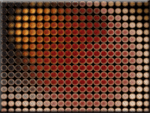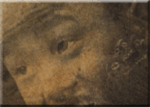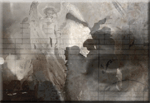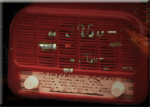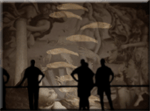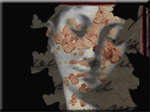|
|
|||
|
More often than not, Nicolas Clauss's work involves collaboration. He and Jean-Jacques Birgé do considerable work together; Birgé composes the audio and sometimes contributes images and, no doubt, much else; there are others, as well; Clauss has collaborated with Antoine Schmitt in a piece called "Dead Fish", with Lamarque for a Pianographique piece called "Sudden Stories", and with Durieu on "Dark Matter" and "Sorcière". You find collaboration present with a wide range of people as you visit flyingpuppet.com, Clauss's site. Though he isn't a programmer, he does know enough Lingo (he uses Director) to do what he wants, it seems. Durieu taught him Director—one could not wish for a better teacher. But if you look at Durieu's work as well as Clauss's, you see that Clauss has gone his own way. Which is of course as it should be. And let us pity the poor student who admires Durieu's work enough to try to follow in his footsteps without being a trained programmer and mathematician. The path to despair, surely. Some go where they cannot be followed. No, Clauss has gone his own way. His Lingo is all in the frame script, in the code of his I've seen. What this means is that the action and interactivity is all controlled by one script, the puppet master script, as it were. Rather than creating more or less independent objects with their own behaviors, Clauss's works are 'single script' works in which the individual media elements are subordinated to the overall behavior of the piece. This can mean that the works are successfully cohesive. And that is what happens in some of his work. It also can mean that the programming is limited in scope. But innovative programming is not what he's after. In the below interview, we find the following exchange:
"Before the Night" and "The Sleepers", especially "Before the Night", I felt, do show real interest in this regard. The painterly aspect of "Before the Night", with its textures overlayed over the more photographic images, are strong in what they say about the aspiration Clauss articulates above. This is, of course, a very different approach to the influence of painting on digital art than we find in the work of Mark Napier, for instance, who is/was also a painter. But that is New York, this is Paris. And one also gets the impression that Clauss still takes painting seriously in a way that Napier can no longer bring himself to do. But, also, Clauss is working with video and photography, whereas Napier is more intent on bringing the art of programming out of the dark. Are they now more different from one another, as artists, than they would have been as painters? From painting, through many other influences, and then to the monitor with both of their work. The frame is larger and smaller in the case of both, than if they had remained painters. The frame of the world now involves computers rather prominently. And the differences between them concerning what ends up on the monitor? And at the fingertips...and where and how it is seen...its full-world context. One of the interesting things about this loosely-affiliated and often-collaborating group of Parisian artists we're featuring is the range of the artists in the arts, media, but also programming and mathematics. And not just the range but the intensity of each of them. The level of artistry and skill therein, passion, and productivity. Clauss makes up for his lack of programming and mathematics skills with a vision of experimentation "with the space between video, interactivity and painting" and much experience and dedication to various arts. And with an unusually strong ability to make collaborative works. And of course, he has a 'poetical' eye and ear. The desire for wholeness that people and ages experience is being fulfilled in quite a beautiful way in the collaborative work of these artists. It will be interesting to see, as his work proceeds, whether he is able to sustain invention without getting into programming more deeply. What often happens to digital artists who can't program whatever they want is that they hit a point where they begin to repeat themselves, unable either to implement what they imagine or, worse, sometimes unable to imagine beyond what they know. Although Clauss is "not interested in code", looking at his work, it isn't hard to see that it depends on the code in important ways. Also, the 'code ideas' are not of the variety we see in the work of Schmitt, for instance, who is working out algorithms that will be useful not only in his own work but concerning human motion more generally, in other applications. It is a kind of combination of art and research that spans art and programming. Similarly, Napier's 'code ideas' often revolve around client-server technology and involve general algorithms for various types of data exchange over the net, in the context of art. Clauss's 'code ideas' are more oriented toward what we might describe as 'narrative issues' and 'digital painting' issues. His synthesis is entirely within the arts. There are code similarities between "One Day on the Air" and "Massacre". One is about painting and the other about radio. The nature of the interactivity in both creates a kind of rhetoric of transition, different in each case. It is a kind of poetical narrative machine. The interactivity drives these works like verbs drive a sentence. It's good for two works because each work is quite different in what it reveals about the range of the interactive idea as narrative or rhetoric machine. These forms have a certain range. There is also an interesting repetition between the effect of 'painting' in "Before the Night" and "Dark Matter". The textured effect when clicking, at times, is used differently in the two different pieces. The effect in "Before the Night" reminds one of the effect overexposure can have on photography. The effect in "Dark Matter" is more explicit about using Director 'Inks' in different ways, but it is also intriguingly a kind of painterly+programmerly mixture of code painting. Clauss experiments with Director's inks like a painter experiments with paint. One is struck also by the excellent synthesis and experimentation with sound in Clauss's work. But also with code in pieces like "Dark Matter", which is a collaboration with Durieu and Birgé. The different arts and media work well together. And the artists themselves collaborate well together. Clauss's aspiration to experiment "with the space between video, interactivity and painting" is exciting and he has already done some intriguing work in this regard. His work has relation with the work of Michiel Knaven of the Netherlands, who also uses Shockwave, and Germany's Reiner Strasser, who is perhaps by now the granddaddy of this type of work for the Web. Also, Clauss is constantly collaborative; he is among a group that ranges brilliantly through the arts, media, programming, and mathematics. His is an art not only between arts, but between people. Also, as he says in the interview, he is at it full-time. This requires a special confidence and a special determination to make this leap with no safety net and stay in the air. May he continue to fly high and be nobody's puppet!
|
|||
| Interview | |||
|
Andrews
|
What is your relation with Durieu, Schmitt, Jean-Luc Lamarque, servolvalve, and Jean-Jacques Birgé, Nicolas? How long have you known them? | ||
|
Clauss
|
We all know each others except for servovalve whom I haven't met, I only know his work which is quite interesting. Frederic is a friend, we met a few months after I saw a CDROM called "Alphabet" that he co-authored with Jean-Jacques Birgé, then nearly nearly 3 years ago he taught me a few basics for Director and finally we co-founded what became his own site now: LeCielEstBleu, a few months before I got my own space, flyingpuppet.com. I met Antoine last year at a party at Birgé's and Jean-Luc Lamarque about the same time. In 1999 I came back from oversea after a trip of 6 years (from India to Korea and Australia), I had a few show in France then and decided to see what was possible with computers. Then I saw in an exhibition the cdrom Alphabet, I was amazed, I asked around me and someone told me it was done with a software call Director. I got the software and started working on it like crazy for 3 months (beginning of 2000). A cdrom of mine came out of these 3 months (called "voyages") and then I contacted one of the author of "Alphabet", Murielle Lefêvre (Dadamedia) who really liked what I'd done, and we started working together on a project I did about dance (with drawn dancers in Flash under Director). Murielle introduced me to the programmer and co-author of "Alphabet", Fred. We became very close with Fred and in 2001 we started LeCielEstBleu. During that time Fred introduced me to Jean-Jacques and we became friends. I knew him by name since I had some CDs he made with his band "Un Drame Musical Instantané", a band playing creative music that had made over 25 records. It was very exciting for me to work with a musician whose music I had known for over ten years. Jean-Jacques is probably in France The multimedia musician. He made some multimedia works as well under his name with Antoine ("Machiavel" which is excellent and based on 111 video loops and "Carton"). JJB comes from Cinema, he made a few movies. When we work together I bring the pictures and first idea and then we go back and forth between my pictures and his sounds. We've been working together for a year and half now. |
||
|
Andrews
|
What are your own concerns that are distinct from what you see them being interested in? | ||
|
Clauss
|
I believe my approach is more of a painter's approach. I'm not interested by code. Let's say I see myself as a painter using Director like a writer would do with the use of word processing software. I feel I could use another medium tomorrow if I wanted (which would be different of course). | ||
|
Andrews
|
Some of your recent work such as "Before the Night" and "The Sleepers" involves an interesting notion of interactive cinema, to me. Do you think that's an accurate characterization? What are your aspirations with that type of work? | ||
|
Clauss
|
Yes and no. I would say interactive motion picture more than cinema which I'm not sure can be interactive. It is something new of it's own kind between experimental movie and painting. My aspiration with it is to experiment with the space between video, interactivity and painting and I find it very exciting. | ||
|
Andrews
|
Your site is flyingpuppet.com. In Lingo, one may "puppet" sprites. I remember seeing the word "puppet" on Antoine's site also concerning his "avec determination" project. Why is your site named "flyingpuppet.com". | ||
|
Clauss
|
…and the PuppetTool by Durieu. "Flying Puppet", "flyingpuppet", I still don't know how to write it and am not sure why I picked up this but I didn't think of the lingo word "puppet". | ||
|
Andrews
|
I see that you have recently collaborated with Jean-Luc Lamarque on a work in the Pianographique site called "Sudden Stories". How did that go? | ||
|
Clauss
|
Basically we used Lamarque's code to make our own pianographique with Birgé. We wanted to make a musical drama that players would use slowly. I normally don't appreciate complex interfaces (I'd rather use the mouse only) but it was challenging to do something very different from what's on flyingpuppet. Jean-Luc is quite open to various styles and collaborations which is good. | ||
|
Andrews
|
I note that you, Antoine Schmitt and Durieu all seem to share an interest in programming motion. Is this something you talk with them about? | ||
|
Clauss
|
Yes, sometimes. I sometimes call them to get some Lingo tips. I guess I know 1% of what they know about programming. | ||
|
Andrews
|
What other concerns and interests do you share with Schmitt, Durieu, servovalve and Jean-Luc Lamarque? | ||
|
Clauss
|
French fries in Belgium and interactivity with Fred, a dear friend with Antoine (Jean-Jacques Birgé) but probably much more. | ||
|
Andrews
|
You all use Director and are artist-programmers. How did this come about? | ||
|
Clauss
|
I don't see myself as an artist-programmer. An artist certainly, but not a programmer. This being said, Director allows inks like Photoshop allows which Flash doesn't. | ||
|
Andrews
|
What do you do for a job? | ||
|
Clauss
|
I'm a full time artist and, yes, make a living out of it mainly through commisionned project like Cinq-ailleurs.com or with workshops. |
||
|
|||

